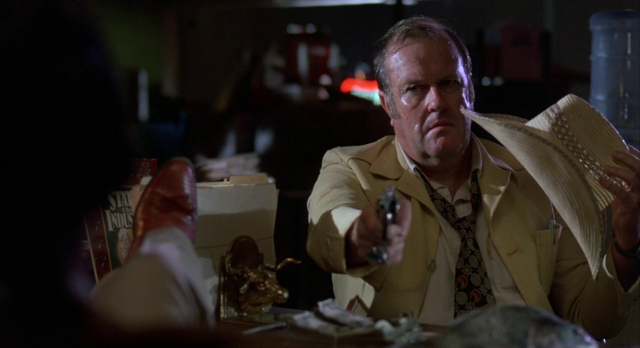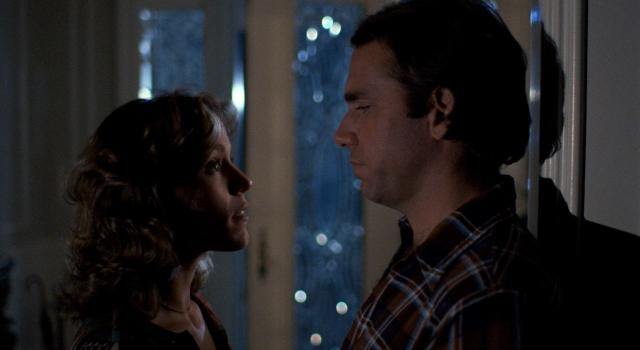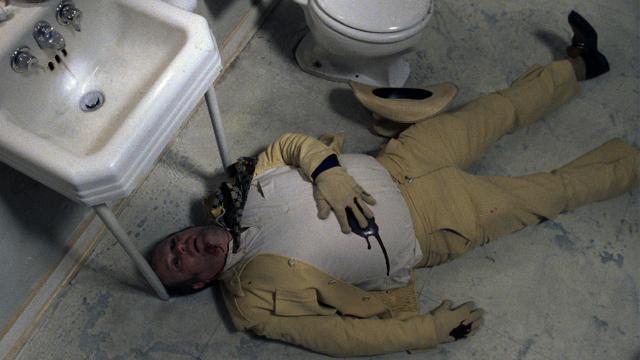Coen well so far
Am I Coen crazy: Blood Simple. (1984)
Movie Feature
Matt Looker
17th August 2018
Welcome to a new semi-irregular feature in which I try to understand my general ambivalence towards the Coen brothers in the face of their overwhelming success and popularity. Do I lack the critical faculty to truly appreciate their work? Do I just not ‘get’ them? Am I an idiot? Most likely, yes, but let’s all go on a filmographical journey to confirm!
And yes, I understand that might be the point, and that all film enjoyment is subjective and relative anyway, but I can’t help wonder if I would have a greater appreciation for their work if I had more familiarity with it... because as it turns out there are some pretty big gaps in my knowledge of the Coen Brothers' oeuvre. So here’s me trying to address that, film by film, in release order, as I get round to watching them.
Starting with my first watch of their feature-length debut, Blood Simple, which I think is about a deadly alien virus or something, I dunno. 34-YEAR-OLD SPOILERS FOLLOW.

On first impression, I’m mostly impressed at how confident this film is for a directorial debut. I was expecting a rough-around-the-edges thriller that smacked of ‘film student’, but this feels like a fully formed Coen Bros movie before they had established what that really was.
In following a film noir plot template - as I know the filmmaking brothers often do - this debut is surprisingly taut and concise compared to my impression of their later work. And this is despite a deliberate reliance on complicating the situation at every turn.
For the sake of a reminder - and so that I can discuss certain moments in detail - here’s a summary of all the major plot beats: jealous bar owner Marty hires private dick Visser to kill his cheating wife Abby and her lover Ray, but the grotesque investigator turns the table on Marty, presenting him with fake evidence of the hit before simply killing Marty for his money, leaving Abby’s gun at the scene to frame her. Ray then discovers Marty’s body and Abby’s gun and, believing she killed him, tries to dispose of the body. Only then Ray discovers that Marty isn’t actually dead, so he finishes the job by burying him alive. Long story short, Visser ends up killing Ray with a rifle and tries to shoot Abby too. Abby ends up getting the upper hand and finishes off Visser, but as she is completely unaware of the events before this scene, actually thinks it is Marty she has killed. By the end, one thing is clear: all this blood has been far from simple.

There are recognisable themes here that are now synonymous with the Coens’ work, with unpredictability and misperceptions being particular key elements throughout. But, even with this unravelling narrative of complicated developments, the fact that the focus is on just four characters and the minimal interactions between them gives the movie a clearer drive than in the more convoluted plots that come in the brothers’ later movies.
This clearer structure also gives the film room to breathe. With stretches of scenes playing out with very little dialogue, Blood Simple shows impressive assuredness when it comes to pacing and having faith in its actors’ performances to carry the story. It all adds up to a steady, cleverly crafted film filled with the kind of perfect tension build and release that you usually only see from more experienced filmmakers.
Both are incorrect, of course, and this constant problem of not seeing the whole picture is something that clearly brings out the Coens’ dry sense of humour. The recurring line “It's taken care of - the less you know about it, the better” is repeatedly disproven, for example, and there’s clear irony in the fact that Abby is the only survivor of the whole sorry situation despite being the original target, with no knowledge of any of the major events that we as an audience have witnessed.

This main theme of being in the dark - quite literally for Abby at the end of the film as she smashes the lights out to hide from ‘Marty’ - feeds into the mantra that Visser delivers in the opening voiceover: “I don't care if you're the pope of Rome, President of the United States, or Man of the Year; somethin' can all go wrong”. I have a feeling that, as I continue with this viewing experiment, this is going to end up being a theme I see a lot.
If nothing else, I can already see why critics find it easy to champion their work, because if this film is anything to go by, the Coens wear their thematic talking points on their sleeve. I can already imagine myself in a student bar telling everyone that the three bullets shown in Abby’s gun at the start of the film, as well as the three hooked fish slowly rotting on Marty’s desk throughout proceedings, all act as excellent foreshadowing for the final kill count because I totally get symbolism.
Onwards then to more noir thriller territory in... (*checks imdb*)... Raising Arizona. Which I also haven’t seen before.

Support Us
Follow Us
Recent Highlights
-
Review: Jackass Forever is a healing balm for our bee-stung ballsack world
Movie Review
-
Review: Black Widow adds shades of grey to the most interesting Avenger
Movie Review
-
Review: Fast & Furious 9 is a bloodless blockbuster Scalextric
Movie Review
-
Review: Wonder Woman 1984 is here to remind you about idiot nonsense cinema
Movie Review
-
Review: Borat Subsequent Moviefilm arrives on time, but is it too little, or too much?
Movie Review
Advertisement
And The Rest
-
Review: The Creator is high-end, low-tech sci-fi with middling ambitions
Movie Review
-
Review: The Devil All The Time explores the root of good ol' American evil
Movie Review
-
Review: I'm Thinking Of Ending Things is Kaufman at his most alienating
Movie Review
-
Review: The Babysitter: Killer Queen is a sequel that's stuck in the past
Movie Review
-
Review: The Peanut Butter Falcon is more than a silly nammm peanut butter
Movie Review
-
Face The Music: The Bill & Ted's Bogus Journey soundtrack is most outstanding
Movie Feature
-
Review: Tenet once again shows that Christopher Nolan is ahead of his time
Movie Review
-
Review: Project Power hits the right beats but offers nothing new
Movie Review
-
Marvel's Cine-CHAT-ic Universe: Captain America: Civil War (2016)
Movie Feature
-
Review: Host is a techno-horror that dials up the scares
Movie Review
